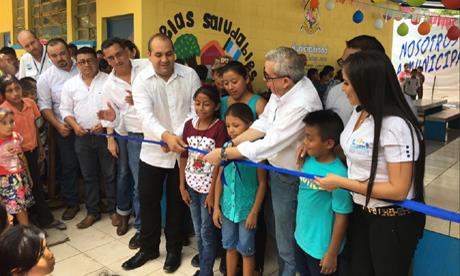The Sustainable Healthy Schools Programme is launched in Chiquimula
The rural school Escuela Oficial Rural Mixta “Los Vados” is the first of twelve that will implement the sustainable healthy school model in the department of Chiquimula.

The Official Mixed Rural School “Los Vados,” located in the municipality of Jocotán, Chiquimula, today inaugurated its school kitchen and dining room as part of the new Sustainable Healthy Schools Programme. The new school kitchen will provide meals to the 266 students at that location. This school is the first of 12 in which the new Programme will be implemented in the eastern department.
“FAO, with the help of the Government of Brazil, is providing technical monitoring to Guatemala to implement the Sustainable Healthy Schools Programme through the Program of Brazil-FAO International Cooperation. Initially, two pilot projects were implemented in Huehuetenango and San Marcos to test the model in the education system tied to the Ministry of Education,” said Diego Recalde, FAO’s Representative in Guatemala, during the inauguration.
The 12 schools in Chiquimula will join the initial ten schools where the pilot project was tested in 2015 and 2016. They are located in San Marcos and Huehuetenango, which have joined the experience of Sustainable Schools, benefiting more than 1,200 primary school-age boys and girls.
The objective of the Sustainable Healthy Schools Programme is to establish a reference point for the implementation of sustainable schools freeding programs, especially from activities such as the involvement of the educational community, the adoption of adequate and healthy school menus, the implementation of pedagogical school farms, refurbishment of kitchens, dining rooms, warehouses, and the direct purchase of products from local family farms for school meals.
Scaling the model of sustainable healthy schools
In 2017, from the positive results achieved in the two pilot projects in San Marcos and Huehuetenango – with the involvement of various players such as city mayors, ministers, representatives – the expansion of the model of sustainable healthy schools was defined to be 400 schools in the department of San Marcos with the span of 12 months.
This model has been implemented in Guatemala in a joint project between FAO, the Ministers of Education, Public Health and Social Assistance, and other local players, and with the help of the regional project: Strengthening School Feeding Programs in Latin America and the Caribbean.
As of now, 135 schools have been added to the five initial schools in the department of San Marcos in the Guatemalan highlands, and today the first of 12 that will be built in the department of Chiquimula, in Corredor Seco, is being inaugurated. “The Pearl of the Orient” is the third department to adopt the Sustainable Healthy Schools Programme based on the Brazilian model, a process which FAO has been tracking.
Over the last four years (2012-2015), the experience of Sustainable Schools has been implemented in Guatemala and seven other countries in Latin America and the Caribbean, involving 1,640 schools, and with the participation of 150,305 boys and girls, within the framework of the Program of Brazil-FAO International Cooperation.
